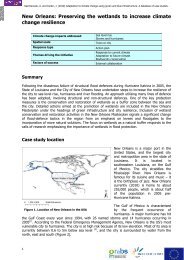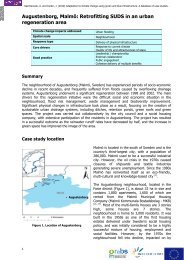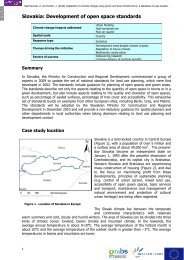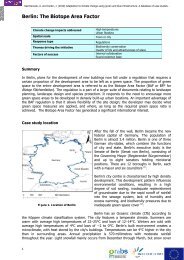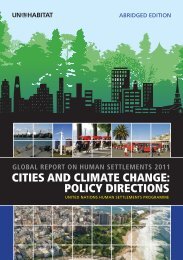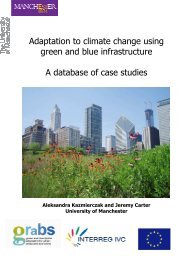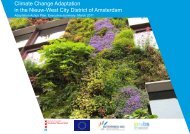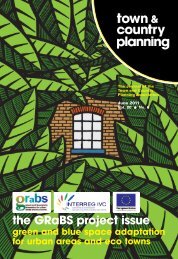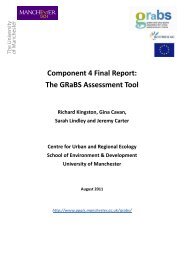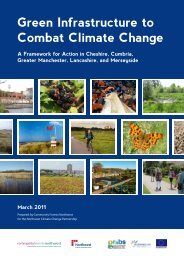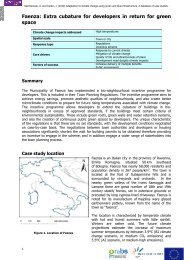GRaBS Briefing Paper 5: Approval of Sustainable Drainage Systems
GRaBS Briefing Paper 5: Approval of Sustainable Drainage Systems
GRaBS Briefing Paper 5: Approval of Sustainable Drainage Systems
Create successful ePaper yourself
Turn your PDF publications into a flip-book with our unique Google optimized e-Paper software.
<strong>GRaBS</strong> <strong>Briefing</strong><br />
approval <strong>of</strong> sustainable<br />
drainage systems<br />
<strong>GRaBS</strong> <strong>Briefing</strong> <strong>Paper</strong> 5<br />
January 2011<br />
1 Background<br />
The Flood and Water Management Act 2010 received Royal Assent in April 2010.<br />
Among the provisions <strong>of</strong> the Act <strong>of</strong> interest to local authorities is how the Act will<br />
affect their decision-making in regards to <strong>Sustainable</strong> <strong>Drainage</strong> <strong>Systems</strong> (SUDS).<br />
This briefing outlines the Act’s provisions on SUDS and the related responsibilities<br />
<strong>of</strong> local authorities in the planning process.<br />
2 Policy context<br />
Schedule 3 <strong>of</strong> the Flood and Water Management Act 2010 sets out the new planning<br />
process for SUDS, which includes a number <strong>of</strong> measures designed to implement a<br />
change in the way that rainwater drainage is managed and to support the uptake <strong>of</strong><br />
sustainable drainage systems. 1 The new approach has a number <strong>of</strong> benefits,<br />
including reduced flood risk and improved water quality.<br />
The legislation requires decisions on sustainable drainage to be made by an<br />
‘approving body’, which is the unitary authority or the county council for the area.<br />
Instead <strong>of</strong> having the automatic right to connect to public sewers, developers now<br />
have to seek approval from the approving body. This is the major change in the<br />
legislation; however, there are no changes to the right to connect foul water to the<br />
public system.<br />
<strong>Approval</strong> <strong>of</strong> drainage systems in new developments and redevelopments must now<br />
be gained from the approving body before construction can commence. The<br />
proposed drainage system will also have to meet national standards for the design,
construction, operation and maintenance <strong>of</strong> sustainable drainage systems in order<br />
to gain approval.<br />
3 Relevance to local authorities<br />
The Flood and Water Management Act 2010 gives local authorities new powers to<br />
assess and manage local flood risk. Local authorities will approve, inspect and in<br />
most cases adopt new sustainable drainage systems. The approval process operates<br />
in parallel with the existing planning process. There are two approval routes:<br />
●<br />
With planning application, when planning permission is required:<br />
●<br />
●<br />
●<br />
●<br />
●<br />
●<br />
Pre-application discussion is encouraged.<br />
The planning application and the SUDS application are submitted to the<br />
planning authority.<br />
The planning authority forwards the SUDS application to the approving<br />
body.<br />
The approving body considers whether the application meets national<br />
standards and consults its statutory consultees (any sewerage undertaker<br />
with whose public sewer the drainage system is proposed to<br />
communicate; the Environment Agency, if the drainage system directly or<br />
indirectly involves the discharge <strong>of</strong> water into a watercourse; British<br />
Waterways, if the approving body thinks that the drainage system may<br />
directly or indirectly involve the discharge <strong>of</strong> water into or under a<br />
waterway managed by them; the relevant highway authority for a road<br />
which the approving body thinks may be affected; and an internal<br />
drainage board, if the approving body thinks that the drainage system<br />
may directly or indirectly involve the discharge <strong>of</strong> water into an ordinary<br />
watercourse within the board’s district).<br />
The approving body returns its decision to the planning authority which,<br />
in turn, informs the applicant <strong>of</strong> the planning decision and the approving<br />
body decision – including any conditions.<br />
The approving body decision is independent <strong>of</strong> the planning decision.<br />
●<br />
When planning permission is not required, the drainage application<br />
can be made direct to the approving body:<br />
<strong>GRaBS</strong> <strong>Briefing</strong> <strong>Paper</strong> 5<br />
●<br />
●<br />
●<br />
●<br />
The SUDS application is made direct to the approving body.<br />
The approving body consults its statutory consultees, where relevant.<br />
The approving body considers whether the application meets national<br />
standards.<br />
The approving body informs the applicant <strong>of</strong> its decision – including any<br />
conditions.<br />
Once the new national standards are created, they will provide the basis for<br />
approval, adoption and connection to the public sewer. Approving bodies are<br />
required to adopt and maintain the majority <strong>of</strong> surface water drainage systems<br />
2
within the public realm, but they may charge a fee for the application or require that<br />
developers deposit a financial bond with them as a guarantee <strong>of</strong> satisfactory<br />
completion <strong>of</strong> the SUDS project.<br />
The approving body is required to adopt and maintain SUDS that serve more than<br />
one property. Highways authorities are responsible for maintaining SUDS in<br />
adopted roads. Adoption can occur on an approving body’s own initiative or at the<br />
developer’s request. If adoption occurs, then the approving body must:<br />
●<br />
●<br />
●<br />
●<br />
●<br />
Notify the sewerage undertaker, the owners <strong>of</strong> land on which the SUDS sits,<br />
consultees, and anyone who has drainage provided by the SUDS.<br />
Designate SUDS on private property as designated features, via a local land<br />
charge, to ensure that property owners are aware.<br />
Designate roads with SUDS under the New Roads and Street Works Act.<br />
Place SUDS on local authority flood risk register.<br />
Release any bond.<br />
The finer details <strong>of</strong> the implications <strong>of</strong> Schedule 3 have not yet been released.<br />
Secondary legislation will set out what will require drainage approval, the fee the<br />
approving body can charge for consideration <strong>of</strong> applications, the powers available<br />
to the approving body to enforce the requirement for approval, the circumstances in<br />
which drainage serves a single property, and the exceptions to the duty to adopt.<br />
Most importantly, national standards have not yet been produced. Consultation will<br />
be a major part <strong>of</strong> shaping the forthcoming national standards, and it is important<br />
for industry, local authorities and interested parties to work closely with the<br />
Government to ensure that effective provisions are made.<br />
4 Notes and further information<br />
1 Flood and Water Management Act 2010.<br />
http://www.legislation.gov.uk/ukpga/2010/29/contents<br />
2 A. Nowosielski: ‘<strong>Sustainable</strong> <strong>Drainage</strong> <strong>Systems</strong> (SuDS) – Policy Context’. Presentation to<br />
Society <strong>of</strong> British Water and Wastewater Industries (SBWWI) Wastewater Seminar,<br />
1 Jul. 2010. http://www.sbwwi.co.uk/cms/Img/SeminarPresentation/File-230.pdf<br />
3 ‘<strong>Sustainable</strong> <strong>Drainage</strong> <strong>Systems</strong> and the Flood & Water Bill’. Hydro International<br />
webpage. http://www.hydro-international.biz/stormwater/flood_and_water_bill.php<br />
<strong>GRaBS</strong> <strong>Briefing</strong> <strong>Paper</strong> 5<br />
3
we are: independent and open to all who want better places<br />
we have achieved: greener cities, new towns, and better homes<br />
<strong>GRaBS</strong> <strong>Briefing</strong> <strong>Paper</strong> 5<br />
we create: ideas, knowledge, publications, campaigns, and<br />
independent policies<br />
we aim to: secure homes, empower communities, and deliver a<br />
sustainable future<br />
...through planning<br />
Town and Country Planning Association<br />
17 Carlton House Terrace<br />
London SW1Y 5AS<br />
+44 (0)20 7930 8903<br />
tcpa@tcpa.org.uk<br />
www.tcpa.org.uk<br />
4



